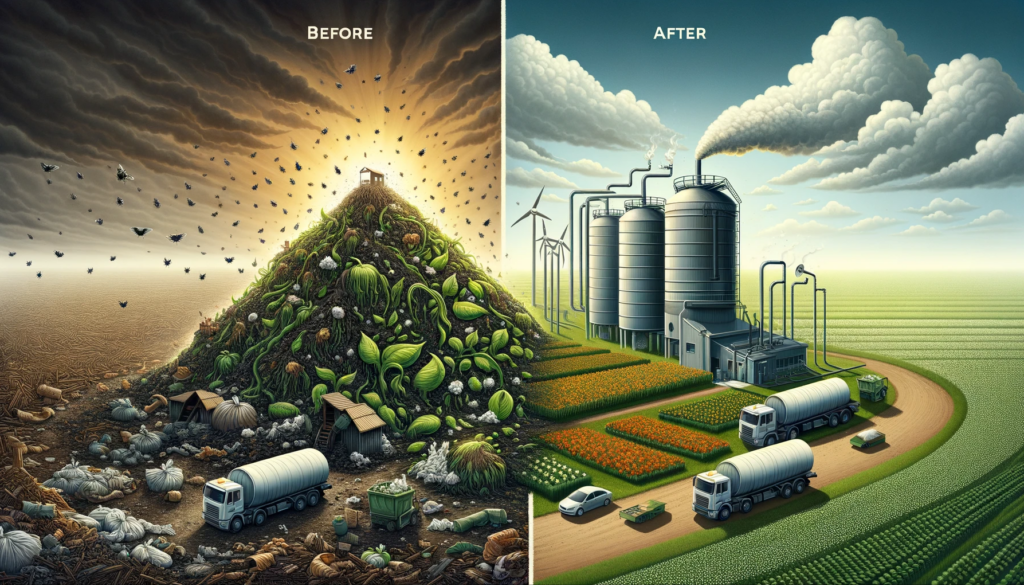Environmental Impact and Sustainability of Biogas
Biogas stands at the intersection of renewable energy technology and environmental sustainability. It offers a solution to managing waste and reducing emissions while generating energy. On Day 4 of our Biogas Deep Dive, we will explore the environmental impact of biogas and its role in promoting a sustainable future.
Biogas and Waste Management
The journey of biogas begins with organic waste, a global issue of increasing concern. Waste from agriculture, households, and industry, if not managed properly, contributes to pollution and greenhouse gas emissions. Biogas technology offers a way to turn this problem into an opportunity by converting organic waste into energy.
- Organic Waste Reduction: Anaerobic digestion significantly reduces the volume of organic waste. The process not only generates biogas but also produces digestate, a nutrient-rich byproduct that can be used as a biofertilizer, closing the loop in waste management.
- Landfill Diversion: By diverting waste from landfills, biogas production reduces methane emissions. In landfills, organic waste decomposes anaerobically and releases methane directly into the atmosphere. Capturing this methane for energy prevents these emissions and harnesses a potent energy source.
Mitigating Greenhouse Gas Emissions
Methane (CH4) is a potent greenhouse gas with a global warming potential 25 times greater than carbon dioxide (CO2) over a 100-year period. By capturing methane from organic waste, biogas production helps mitigate climate change.
- Renewable Energy Production: Biogas is a form of renewable energy. When used, it releases CO2 that is part of the current carbon cycle, unlike fossil fuels which add CO2 that has been sequestered for millions of years.
- Displacing Fossil Fuels: Using biogas as a substitute for fossil fuels further reduces greenhouse gas emissions. Every unit of energy produced by biogas is a unit that doesn’t have to come from coal, oil, or natural gas.
Biogas and Sustainable Agriculture
Agriculture is both a contributor to and a casualty of climate change. Biogas production can transform the sector by providing a sustainable way to manage waste and produce energy.
- Biofertilizer: The digestate from biogas production is rich in nutrients like nitrogen, phosphorus, and potassium. Unlike synthetic fertilizers, which require significant energy to produce and can lead to nutrient runoff, digestate is a more sustainable option that recycles nutrients back into the soil.
- Energy for Farm Operations: Farms can become energy independent by using biogas produced on-site, reducing operational costs and the carbon footprint of farming activities.
Circular Economy and Biogas
The concept of a circular economy is about minimizing waste and making the most of resources. Biogas production is a textbook example of this principle in action.
- Resource Efficiency: By converting waste into energy and fertilizer, biogas maximizes the utility of organic materials.
- Economic Value: Biogas systems can transform waste management from a cost center into a source of income, providing economic incentives to recover and reuse materials.
Biogas in Urban Environments
Urban areas generate vast amounts of organic waste and have a high demand for energy. Biogas can play a crucial role in urban sustainability.
- Wastewater Treatment Plants: Many wastewater treatment facilities have adopted biogas technology to treat sewage sludge and generate energy, reducing the environmental footprint of waste management.
- Community Biogas Programs: Community-scale biogas projects can manage local organic waste, like food scraps, and provide energy back to the community, fostering local resilience.
Challenges to Environmental Sustainability
While biogas has many environmental benefits, it also faces challenges that must be addressed to maximize its sustainability.
- Technological and Financial Barriers: The initial investment for biogas infrastructure can be high. Moreover, the technology requires skilled operation and maintenance.
- Environmental Regulations: The success of biogas projects often depends on environmental regulations that can vary widely by region and can either enable or hinder project development.
Policy and Global Commitments
Governments around the world are recognizing the role of biogas in environmental sustainability.
- Renewable Energy Targets: Many countries have set renewable energy targets that include biogas as a key component.
- Climate Change Agreements: International agreements, like the Paris Agreement, underscore the importance of reducing methane emissions, a goal to which biogas can significantly contribute.
Conclusion
The environmental impact of biogas is largely positive, offering a way to reduce emissions, manage waste sustainably, and transition towards a circular economy. It embodies the principles of sustainability, turning challenges into opportunities. As we look forward to the final day of our series, we will envision the future of biogas, considering the innovations and policies that will shape its trajectory in the years to come.

